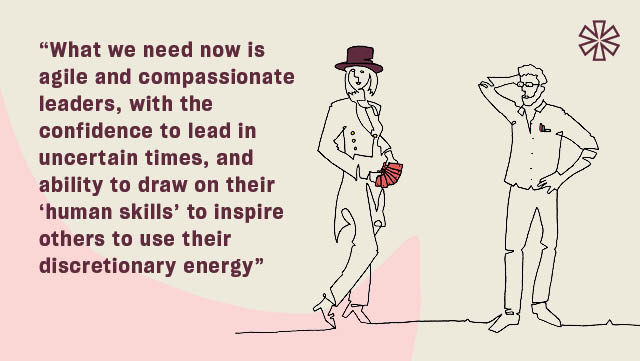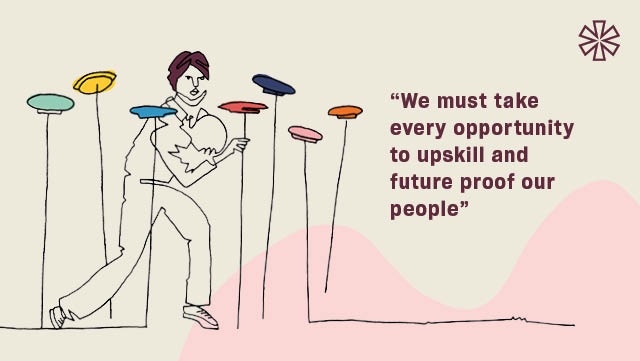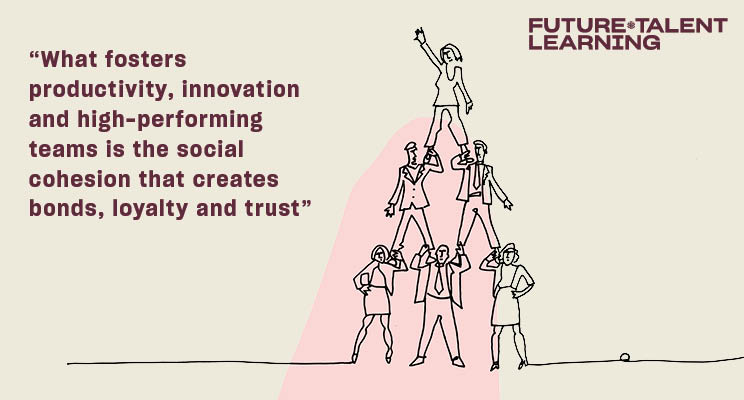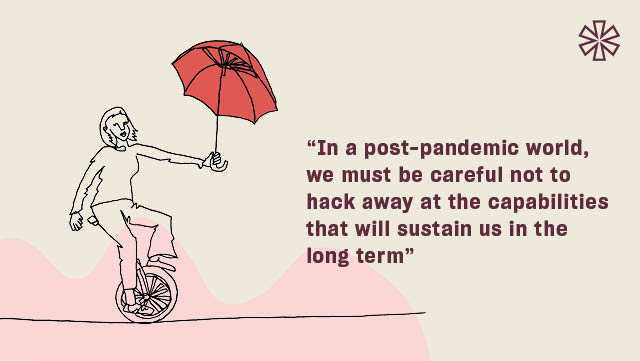As Covid-19 has demonstrated, we need agile and compassionate leaders with the confidence to lead in uncertain times, and the ability to draw on their ‘human skills’ to inspire others to use their discretionary energy. Jim Carrick-Birtwell discusses what it will take to foster creativity and supercharge productivity in the long-term.
When anyone mentions productivity, I picture chickens – a circumstance I blame on author and entrepreneur Margaret Heffernan.
In her (highly recommended) TED Talk from 2015, she describes an experiment by evolutionary biologist William Muir, which involved dividing chickens into two groups: an average flock which he left alone for six generations, and a flock of the most individually productive chickens.
With the second group, he intervened each generation, selecting only the most productive for breeding. After six generations had passed, the average group was thriving, and egg production had dramatically increased. But in the group of ‘superchickens’, only three were left, having pecked their peers to death.
“The individually productive chickens had only achieved their success by suppressing the productivity of the rest,” summed up Heffernan, making clear the analogy with the modern workplace, where the value is often placed on star employees who outperform others.
Rather than delivering a recipe for productivity, she believes this leads to “aggression, dysfunction and waste”.
The damning fact is that “for the past 50 years, we’ve run most organisations – and some societies – along the ‘superchicken model’,” she stressed.
Capabilities fuel productivity
This message resonated and stayed with me. It is highly pertinent to our volatile digital age, in which organisational performance relies strongly on its capability – which equates to the capabilities of its people.
It is a call to democratise learning, in order to instil – in the many – the skills and abilities needed to navigate constant change.
As Covid-19 has drummed home, what we need now is agile and compassionate leaders, with the confidence to lead in uncertain times, and able to draw on their ‘human skills’ to inspire others to use their discretionary energy.

According to PwC, 80% of CEOs see the lack of soft skills among employees as a top-three barrier to growth. During the pandemic, their dearth could undermine some organisations’ very survival.
Self-awareness and collaboration
It is also a message that underpinned the development of our Transformational Leadership Programme, a new type of fully immersive online learning (funded under the apprenticeship levy, making it free to levy-paying organisations) that can give people the emotional intelligence and ‘soft skills’ to succeed in the modern workplace.
Mindful of the need for empathetic leadership and collaboration, its modules cover self-awareness, self-management, communication, relationships and change management, with the emphasis on learning by doing. It teaches people how to become more productive personally, and how to get the best out of their teams, contributing to organisational performance.
After all, what fosters productivity, innovation and high-performing teams, Heffernan stresses, is the social cohesion that creates bonds, loyalty and trust. A “culture of helpfulness”, driven by empathy, equality of contribution, cognitive diversity and inclusiveness.
When Margaret spoke (from the heart) at our 2018 Future Talent Conference, she paid tribute to the value of friendship as the social capital underpinning individual and organisational creativity, resilience and, ultimately, success.
“This is not about networking. I’m talking about soul mates, people who can see your qualities; who may be competitive, but not with you, only for excellence,” she explained.
This is why our programme homes in on communication and relationship building, from facilitating psychological safety in the workplace, to mastering different forms of collaboration and thoughtful ways of building and maintaining connections. As more people work flexibly and remotely, these skills will become all the more necessary, involving new skill sets and expertise.
In a 2017 study of 1,153 employees by social scientists, 52% of remote workers said they felt that on-site colleagues didn’t treat them equally. However, good managers will go out of the way to form personal bonds with remote employees and to unleash their productivity.
Unlocking potential and productivity
While today resembles an ‘employer’s market’ as Covid-19 causes higher unemployment and temporary access to scarce talent, tomorrow could see this turned on its head.
In a post-pandemic world, we must be careful not to hack away at the capabilities that will sustain us in the long term, instead taking every opportunity to up-skill and future proof our people, even as we struggle to survive.
“Efficiency and productivity are very different,” wrote management consultant Michael Mankins in a 2017 article for Harvard Business Review.
“At a time when so many companies are starved for growth, senior leaders must bring a productivity mindset to their business and remove organizational obstacles to workforce productivity.”

One of these obstacles is a workforce ill-equipped to meet the shapeshifting challenges of the 21st century. Overcoming this involves an emphasis on relationships and an investment in up-skilling, to unlock all our people’s potential – and productivity.
As Heffernan concludes: “It is only when we accept that everybody has value that we will liberate the energy and imagination and momentum we need to create the best beyond measure.”
To find out more about how to up-skill your employees through the Transformational Leadership Programme, contact us at learning@futuretalentgroup.com.

















